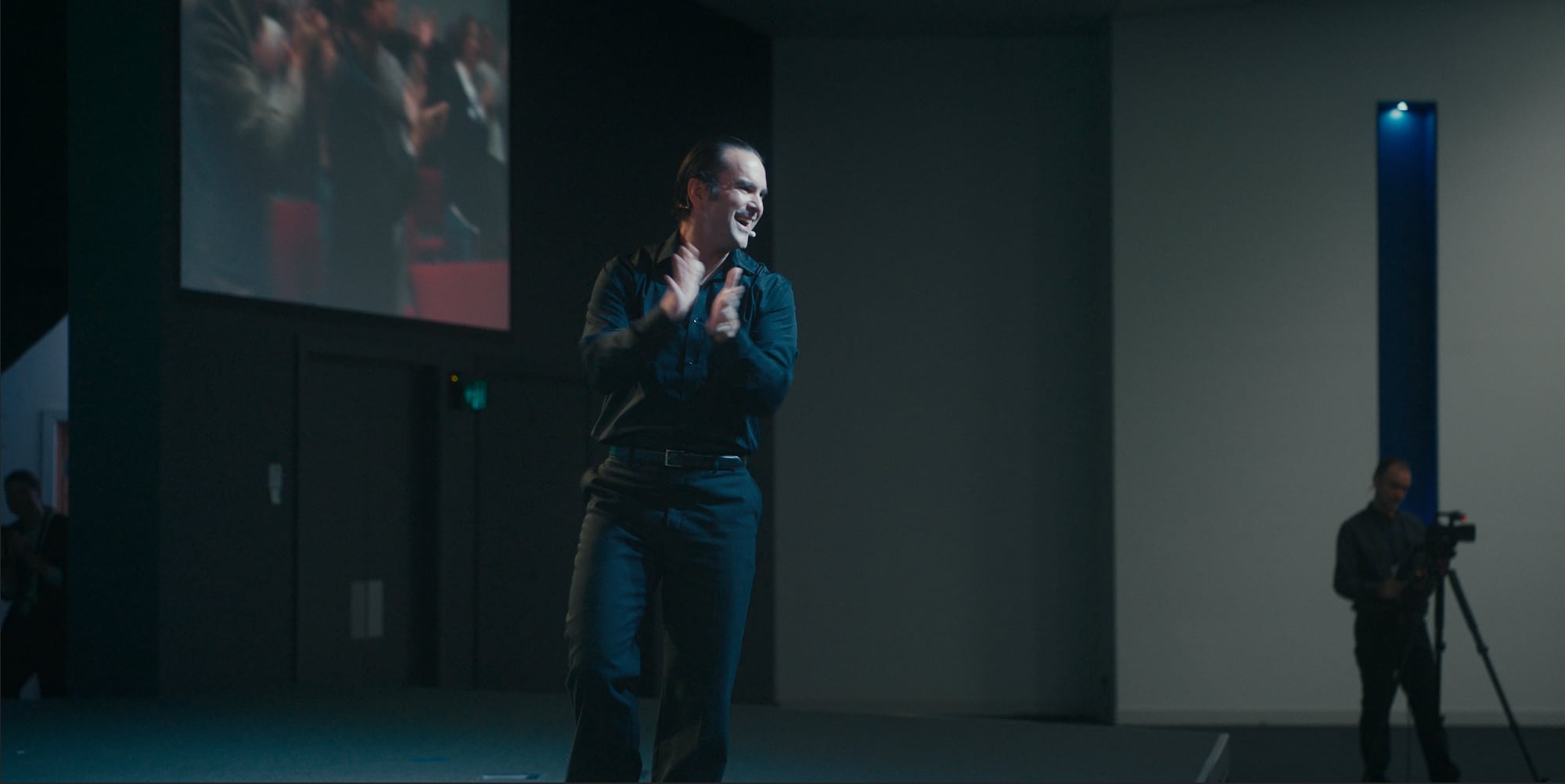
When a vulnerable man attends a personal development forum to address his declining mental state, he finds himself at a moment of realisation. Ned Donohoe’s brilliant drama The Forum was birthed through a personal experience the filmmaker had with this type of self-help seminar. Between the years of 2014 and 2016, Donohoe attended a number of classes designed to improve his mental well-being, as he learnt during his time there, however, that wasn’t all they were designed for. What’s unique about Donohoe’s film is that he portrays his characters with a deep empathy and understanding, this isn’t a satire or parody of these situations. Instead, it delves into the emotional wiring of them and unpacks how we find ourselves in these places. DN is delighted to premiere The Forum online in conjunction with a conversation with Donohoe where he delves into the film’s origins, how he wrangled a set with over 60 extras, and the multi-camera setup he employed to capture everything he needed across their two shooting days.
Where did the journey of creating The Forum start?
Between 2014 and 2016 I attended five personal development or ‘self-help’ forums in Melbourne, Australia at the insistence of an assertive friend. I was the perfect candidate, vulnerable from a recent breakup and naive to the unscientific and unregulated ways of the industry. I should preface that my self-help journey wasn’t all bad. Meaningful lessons were learnt that I have since transposed to my day-to-day life, as well as general self-awareness building. Despite this, something was off. Whether it be the insistence on purchasing the next course, insensitivity towards attendees, the ‘othering’ of those outside the self-help fraternity, naff aesthetic and rhetoric, manipulation via emotive music or the assumption of infallibility by forum leaders, I knew the world wasn’t for me.
It is my hope that throughout that viewers experience moments of confusion like I did over my self-help journey.
My departure from self-help was when my father caught wind that I’d been attending one of these forums after I called him one night ‘apologising’ for everything I’d done wrong over the years, this is an exercise one of these courses make you do. The next morning I woke up to him outside my house, standing in front of his car, holding a photo of me as a kid, and exclaimed “This is my son”. He then told me he wanted me to stop attending these events. Dramatic stuff, right? So yeah, a bit of a tangent there, but all the bizarre and morally questionable happenings that I witnessed at these seminars were the original inspiration for this film.
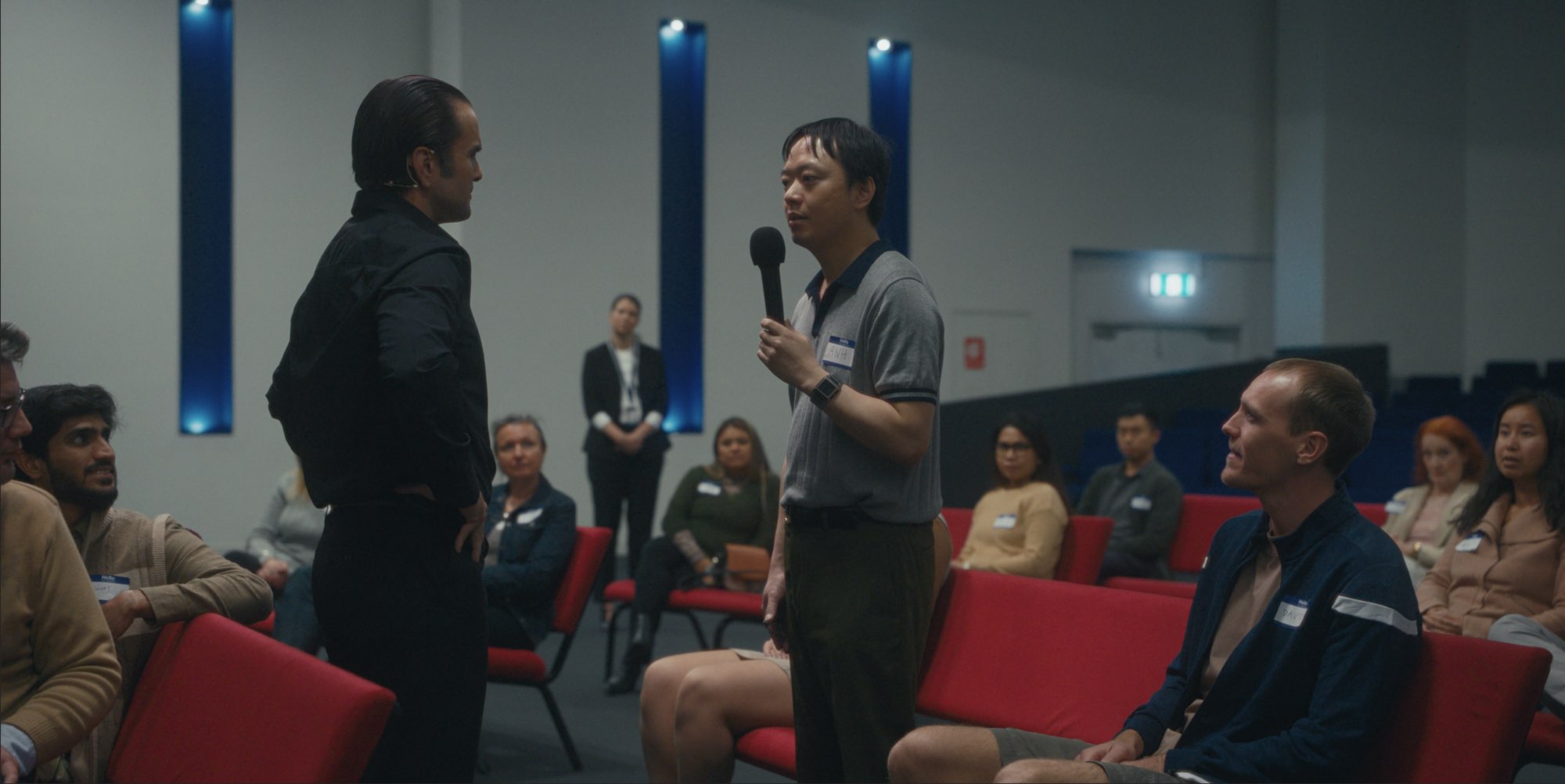
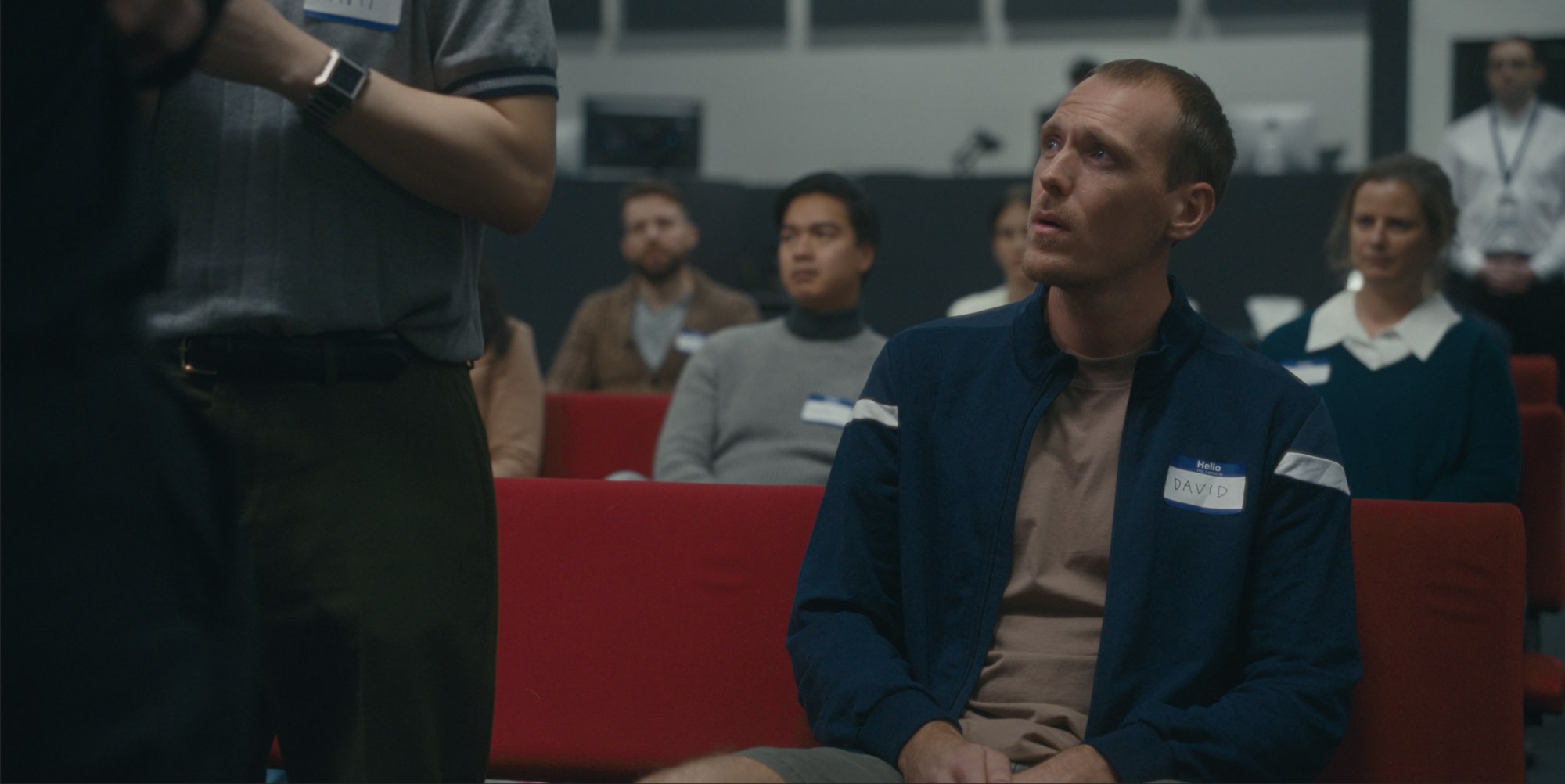
What were you looking to highlight with the film about these spaces?
My goal was to highlight self-help’s willingness to prey on society’s most vulnerable, with the inherent profit motive that incentivises gurus to create the ‘perception’ of real change, then leaving them vulnerable and bare of any meaningful strategies to deal with their return to everyday life.
More broadly though, I wanted to critique the individualistic self-help ideology that posits any issue, problem or life tragedy, no matter how deep, systematic or beyond our control, is ultimately our responsibility and can be quashed through positive thinking and other popular self-help modalities. In my opinion, it is this ideology that informs so much of the mistreatment and misdiagnosis of vulnerable self-help participants. The reality is that some issues, such as David’s mental health situation, aren’t going to be fixed through yelling positive affirmations in one weekend, and neither should they.
Was it a challenge to maintain that stance on these institutions whilst creating characters the audience would root for?
Putting aside my misgivings for self-help, it was important this film took the audience on a journey that didn’t immediately dismiss The Forum as harmful nonsense. In order to do this, I wanted the audience to care for David and see him get well. This sympathy may wane for some of the audience, as he seemingly forgoes his basic ethics in a bid to fit into the community and ‘breakthrough’. It is my hope that throughout that viewers experience moments of confusion like I did over my self-help journey i.e. “Are these people doing good work, or do they just want the money?”
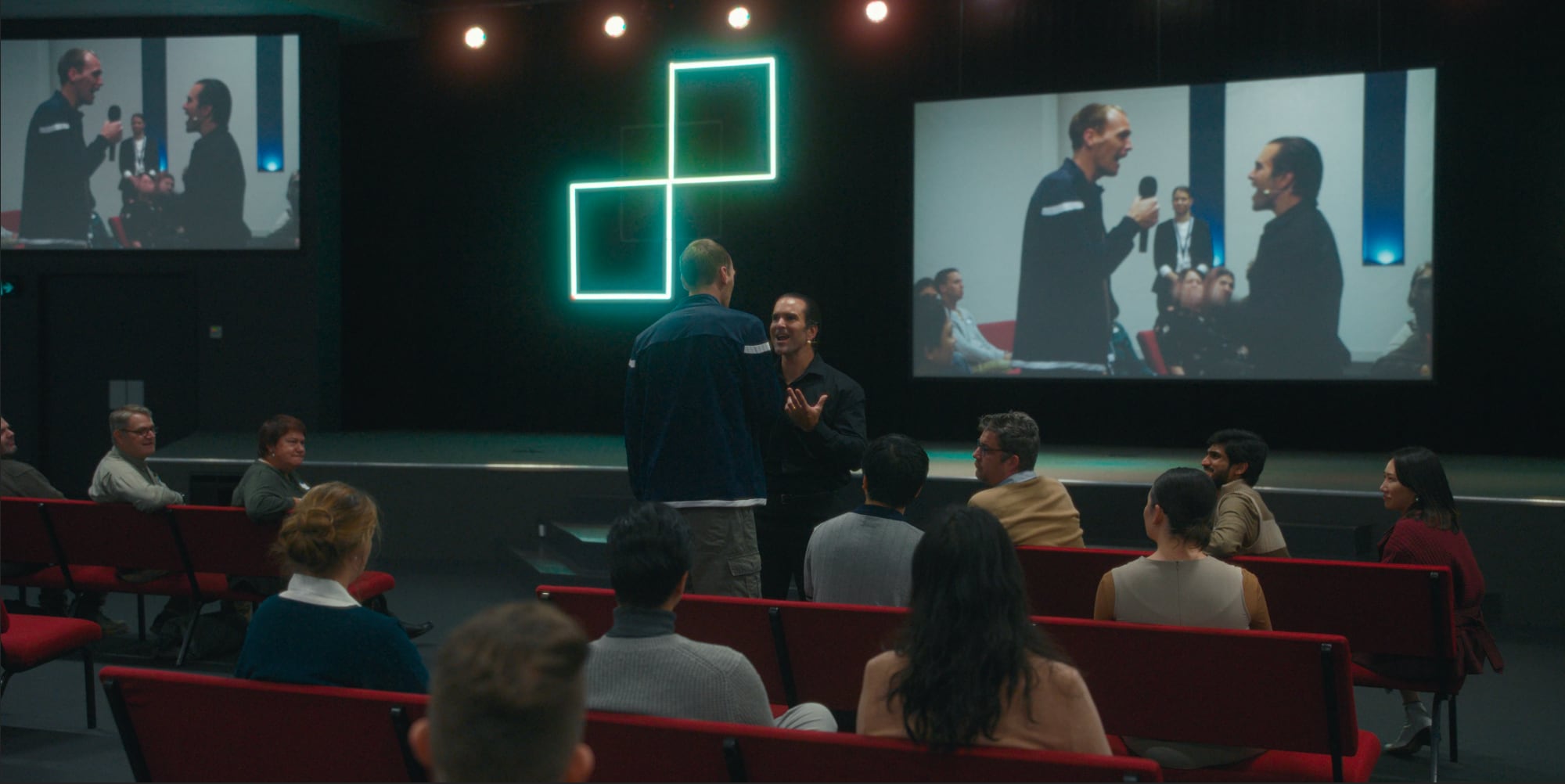
How was it getting the production off the ground, practically speaking?
Given the scale of the film, I decided from the beginning that two producers, Rob Summons and Genevieve O’Shea, would be necessary to achieve my vision. It was a real family vibe as we are all close friends. From the moment I first reached out to them, to production, it was roughly six months. Rob did an amazing job of finding the location, which is actually a Pentecostal Church located in outer Melbourne. The location required minimal intervention in regards to production design, as we loved the already existing look. It was also a blessing as they allowed us to use and feature all their expensive technical equipment i.e. giant projector screens, sound mixing board, cameras, strobe lighting, etc. for no additional cost.
Putting aside my misgivings for self-help, it was important this film took the audience on a journey that didn’t immediately dismiss The Forum as harmful nonsense.
One of Gen’s major roles was wrangling our original goal of 60+ extras. To no fault of Gen’s, on the day only 40 rocked up, so we acted quickly and removed a row of seats and spread the extras out more. In some scenes we even had to get crew in to fill the space, thank you team! The lesson for next time is to organise at least 20% more people than you think you need.
And in terms of your actors, how much time did you have with them to refine their performances?
With performance, we had one full day of rehearsal on location, meaning the actors could learn their marks, as well as help my DOP and I fine-tune our sets up and blocking. Leading up to the production, I would also spend time with each main character on the phone refining and discussing their roles. I had Will Johnston, who plays David, watch lots of Tony Robbins interventions that exist on YouTube. For Andrew Lorzeno, who plays Dr. Tom DiMarino, I got him to do the same, you might notice his clapping technique mimics that of Tony Robbins. Funnily enough, Andrew is actually a life coach himself, one of the good ones. He was drawn to the project as he has experienced many incidents as explored in The Forum, meaning he was uniquely placed to portray this type of character. I also wanted someone with an authentic American accent which he has.
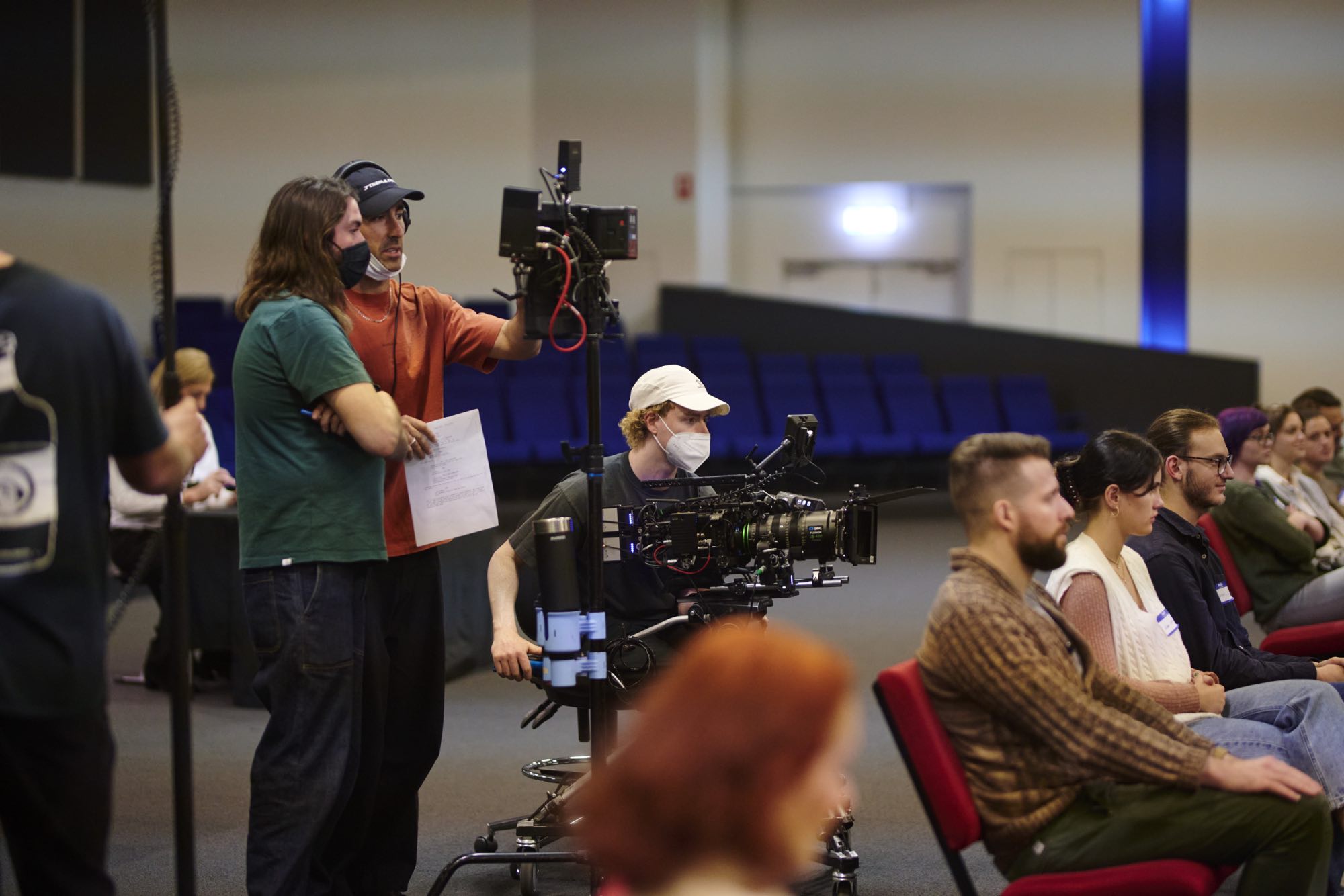
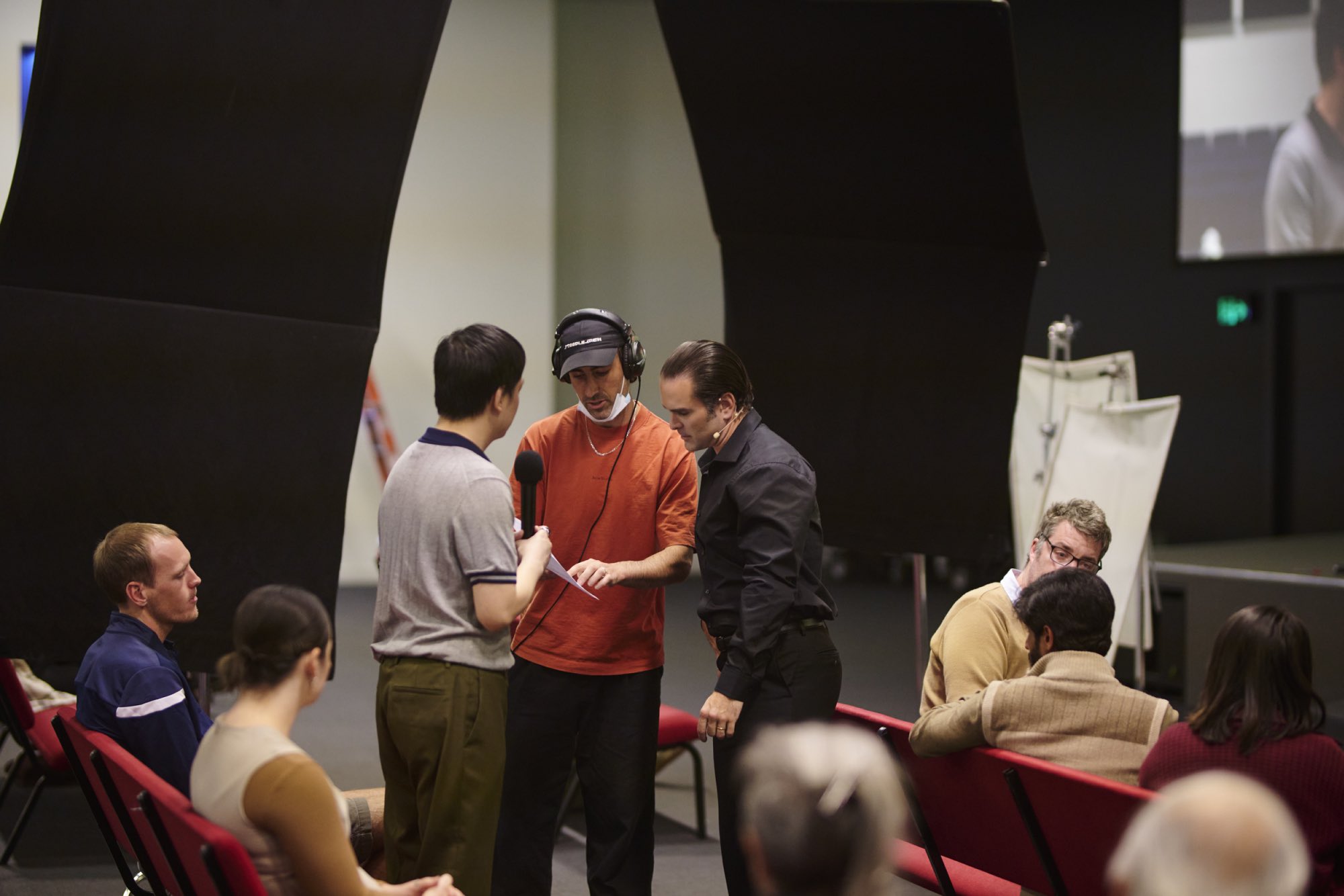
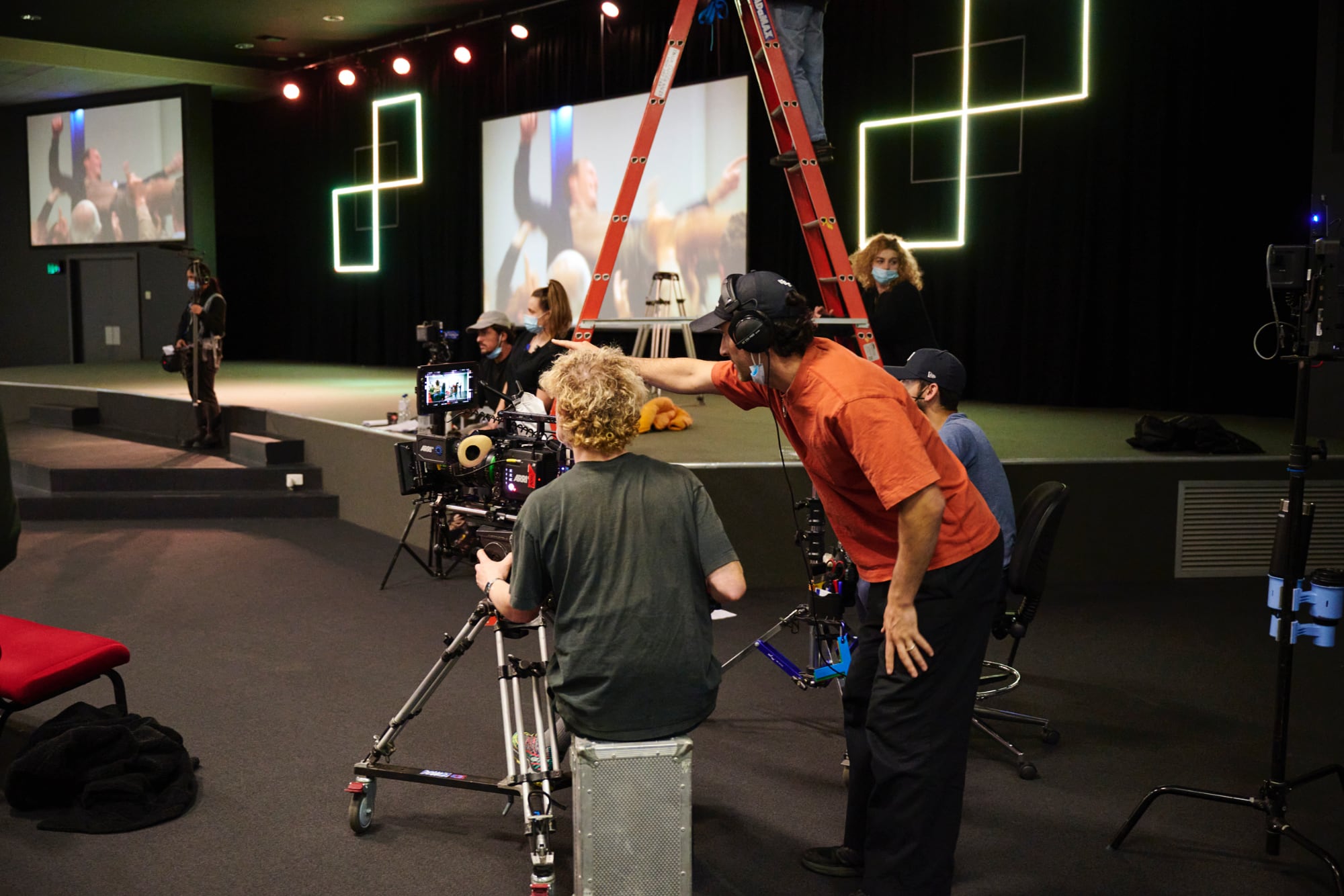
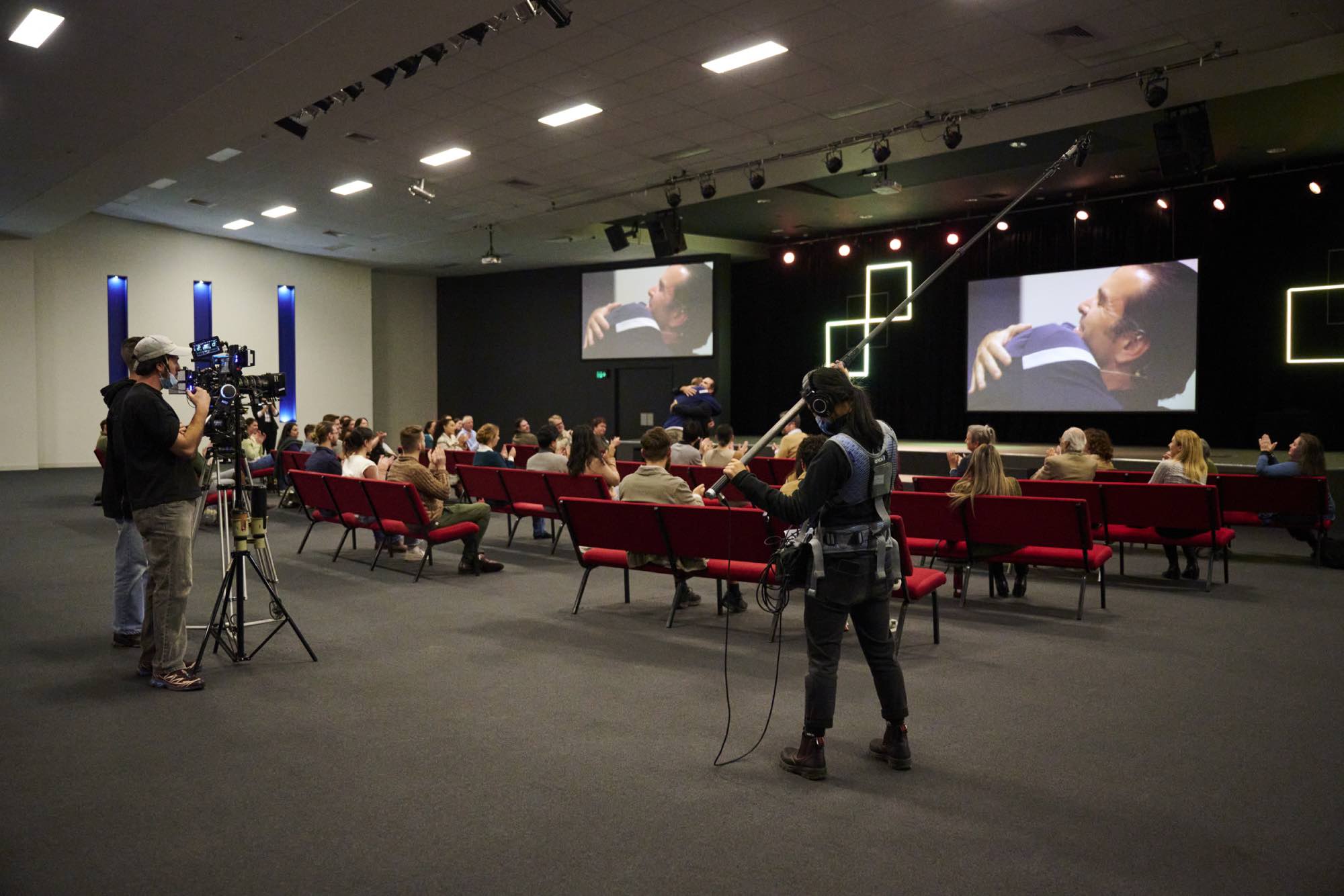
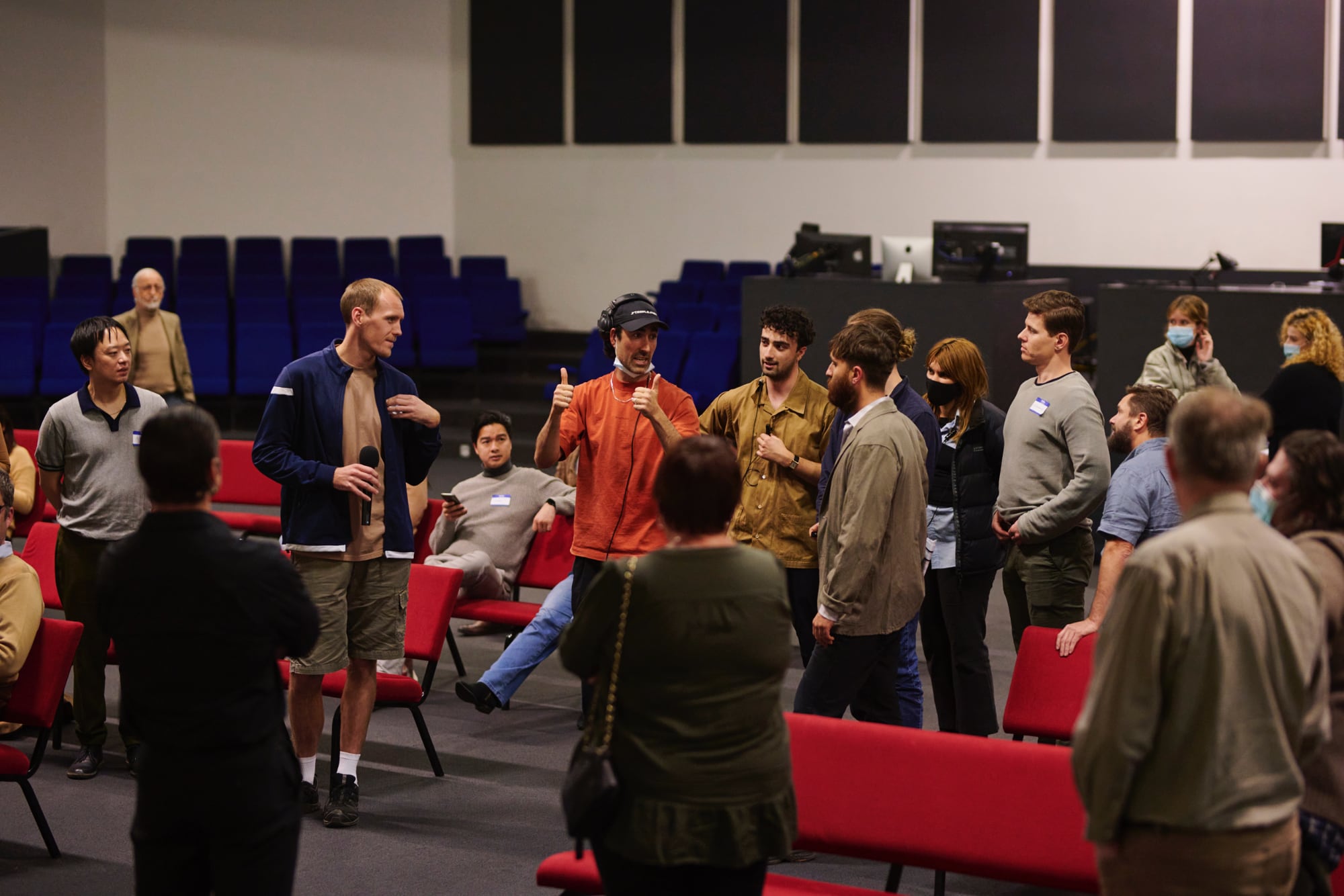
When it came to the tech and equipment you used, were there any pieces that allowed you to specially capture the certain look you were after?
Given the amount of extras and limited budget, we had to squeeze a lot into the two days of shooting. Given this, it was my talented DOP Joey Knox’s idea to shoot with two Arri Mini LFs, meaning we could get almost twice as much done, especially with the individual ‘intervention’ scenes. To save even more time, we made the decision to shoot on just one zoom lens per Arri, the Fujinon Premista 28-100mm T2.9 Large-Format Cine Lens, meaning we never had to worry about lens changes. I am also partial to a lovely zoom. With the strong intent of conveying a sense of realism, our 2nd Camera Operator Jesse Gohier-Fleet was instructed to capture as many natural reactions of audience members throughout, many of which made the final cut.
Much of this footage would zoom obnoxiously close to the attendees faces, working to mirror the obtrusive and overbearing tactics of self-help practitioners.
In a bid to reflect the control and overbearing nature of self-help, we also had one of the actors operating a real 4K video camera that you can see projected onto the three big screens. Much of this footage would zoom obnoxiously close to the attendees’ faces, working to mirror the obtrusive and overbearing tactics of self-help practitioners. It also created great depth in many of the frames during interventions, as well as gave Dr. Tom DiMarino a God-like presence in the room. Lighting-wise, given the size of the room, there was nothing we could do with the wide shots besides turn sections of the house lights on and off. With the medium shots and close ups we were able to shape faces with more control.
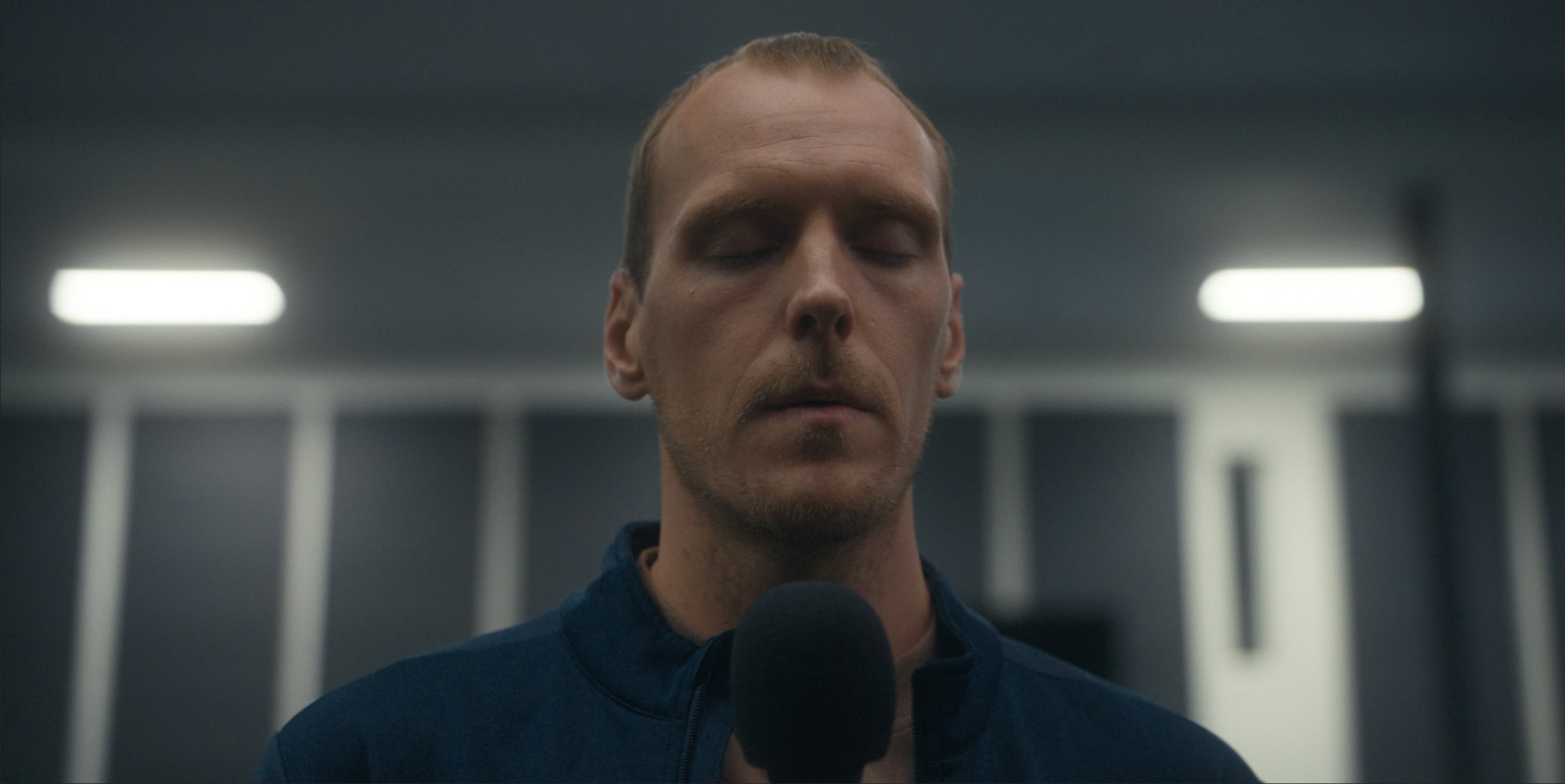
I’m curious to know if you’ve had any responses to the film from people who have been to self-help forums. If so, what have they made of it?
I’ve had quite a few people who’ve attended these types of seminars tell me that the piece reflected the world quite accurately. Given that the world of The Forum is an amalgamation of different variations of the self-help experience, I’m hoping there are elements for many people to relate to.
What are you working on at present?
Looking to do more music videos this year, starting with one on London based Artist Myles Morgan. Short film-wise, I’m currently writing a script about a documentary film crew who is given exclusive access to a known cult in the UK countryside. The idea is that the cult has just been exposed in a Netflix documentary and the film crew has sold it as giving them a chance to tell ‘their side of the story’. Some weird shit goes down obviously, and I’m looking to explore themes surrounding the ethical quandaries and moral obligations within documentary filmmaking. I plan to shoot it somewhere in the UK countryside by hopefully the end of 2024.


